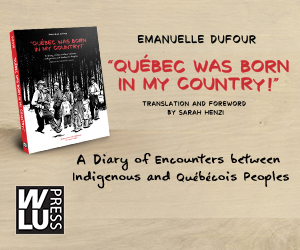The Joy of Reading: discussion with Sandy Crawley of the National Reading Campaign
By Bianca Lakoseljac
By Bianca Lakoseljac: OB Writer in Residence
The importance of literacy in all cultures and societies cannot be underestimated. In Canada, it remains one of our main priorities. However, in some parts of the world, the opportunity to develop reading and writing skills may be unavailable to many due to a number of obstacles such as civil strife, a troubled economy and poverty, or attitudes toward child labour and the schooling of girls and women—and I am reminded that we should not take literacy skills for granted. They are the essential foundation for learning and subsequently for improving the standard of living.
Denying access to education for girls and women has a long history. I recall the stories my grandmother, who was born in 1901, told me. She lived in Serbia, which is now a strong champion of education and literacy. However, at that time in many families, education for girls was considered unnecessary. It was common for fathers to forbid their daughters access to books, and learning to read and write was reserved for male children. My grandma’s brother taught my grandma to read and write, secretly without their father’s knowledge—and to their mother’s delight. My grandma was very proud of being literate at a time when many of her friends were not as fortunate. She was also pleased that her daughter, my mother, became a schoolteacher—trained to pass on her knowledge to others, the new generations, male and female. Growing up with these role models instilled in me a love of literature, the arts, and other creative pursuits.
When the opportunity to serve as the Writers Union of Canada’s (TWUC) liaison with the National Reading Campaign (NRC) arose, I embraced it wholeheartedly. The experience has been rewarding in many ways. It keeps me abreast with the initiatives the NRC is undertaking to cultivate the joy of reading. My involvement with the NRC also reminds me how fortunate we Canadians are to be such strong proponents of education and literacy, and to have an organization that not only fosters a milieu favourable to Canadian readers, such as educators, politicians, librarians, business professionals, publishers, writers, and parents and children of all ages, but also facilitates reading opportunities through various events Canada-wide.
I am pleased that Sandy Crawley, Executive Director of the NRC, has generously agreed to provide valuable insight into the NRC’s work in promoting literacy in Canada.
1. Bianca Lakoseljac: What initiatives is the NRC undertaking in 2016/17 in its objective to make reading a national priority in Canada?
Sandy Crawley: The NRC is moving ahead with our advocacy and research efforts as resources permit. Our flagship program, Reading Town/Ville lecture is our priority for the first half of 2017. This weeklong festival celebrates reading in all genres with an emphasis on presenting Canadian authors. It takes place in early May and will be held in three cities, Charlottetown, PEI (third annual), Sudbury, Ontario (2nd annual) and Gatineau, Quebec (for the first time). With the generous support of the TD Group and the Canada Council for the Arts we bring in well-known authors including GGLA winners but we feature local authors. Our partners are public libraries, k-12 and post-secondary educational institutions, publishers, booksellers and everyone in the community who has an interest in promoting reading. Other key partners are The Canadian Children's Book Centre and local businesses in each municipality.
2. BL: What efforts is the NRC undertaking to promote and facilitate access of Canadian authored material to educational institutions and/or to the general public?
Your CanLit News
Subscribe to Open Book’s newsletter to get local book events, literary content, writing tips, and more in your inbox
SC: We continue to promote the need for diversity of choice and reading for pleasure as critical to good public education. We always remind our partners among ministries of education, school boards and trustees, teachers and parents that students must have access to books that reflect our culture in all genres if we are to inspire engaged citizens who can meet the social, cultural and economic challenges we all face.
3. BL: In addition to the roundtable discussions the NRC has facilitated over the past three years, which brought together Canada’s First Nations leaders for the purpose of coming up with a plan for improving access to reading material in their communities, what other initiatives is the NRC undertaking within the First Nations communities?
SC: We have a very strong indigenous committee and we have taken a leadership role in creating a plan to establish and fund an Aboriginal Library association. We are working with the new Federation of Public libraries and with the federal Minister (Dr. Carolyn Bennett) to develop a plan to create libraries for the 500 plus First Nations communities who lack access to public libraries and we have put forward a specific plan to the federal government to begin this work.
4. BL: How can Canadian authors get involved in supporting the NRC’s campaign?
SC: We are always open to working with authors. We continue to publish reviews of Canadian children's books online and we were proud partners in the first Canadian Writers Summit at Harbourfront in Toronto in June 2016. We are also extremely pleased to announce that TWUC Executive Director John Degen has joined our board of directors, which will guarantee strong liaison with Canadian authors on the opportunities for partnerships with the NRC.
5. BL: What message or advice would the NRC wish to pass on to Canadian readers, writers, and the general public?
SC: We continue to use all avenues, public events, social media and direct communication to promote our values around reading. We emphasize the importance of going beyond basic literacy to embrace the importance of reading for pleasure, beginning in early childhood and continuing through life as a key to individual and collective fulfillment. Please share this link to an engaging public lecture by renowned expert professor Stephen Krashen that we have posted online in three segments for those who want to gain greater understanding of the profound effects of reading for pleasure on every aspect of our lives:
https://www.youtube.com/watch?v=rX0_R9ZdYfQ&t=559s
https://www.youtube.com/watch?v=VwPeitnsORw&t=93s
https://www.youtube.com/watch?v=C2lrkxJNr6s&t=128s
Sandy Crawley (sandy@nationalreadingcampaign.ca)
is Executive Director for the National Reading Campaign.
http://www.nationalreadingcampaign.ca
...........................................................
The views expressed in the Writer-in-Residence blogs are those held by the authors and do not necessarily reflect the views of Open Book.
Bianca Lakoseljac second novel, Stone Woman, which relives Toronto’s 1967 “summer of love”, has just been released by Guernica Editions. Bianca is the author of a novel, Summer of the Dancing Bear; a collection of stories, Bridge in the Rain (Guernica, 2012, 2010); and a book of poetry, Memoirs of a Praying Mantis (Turtle Moons Press, 2009). She is TWUC liaison for the National Reading Campaign, past president of the Canadian Authors Association, Toronto, has judged various national literary competitions, and has served on a number of literary contest panels. Bianca taught at Ryerson University and Humber College.
You can write to Bianca throughout the month of November at writer@open-book.ca.


